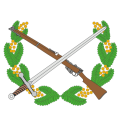The Centre for Australian Army Leadership (CAAL) is pleased to launch the inaugural edition of its Leadership Quarterly.
The first edition, available in the pdf link below was written by our esteemed guest author Chief of Army, Lieutenant General Rick Burr, AO, DSC, MVO. Titled Leadership, Character and Ethics in our Profession, the Chief of Army explains his logic behind creating the CAAL in 2019 and discusses the way leadership and culture underpin our profession.
Leadership, character and ethics in our profession Building upon the work of the CAAL’s biennial Australian Army Leadership Seminar, the Quarterly’s goal is to generate conversation and contribute to the ‘contest of ideas’ around leadership, character and ethics in the Australian Army. Editions can serve as the basis of leadership development days, study sessions and promotion course preparation.
Intended for release four times per year, the Quarterly is available on the CAAL website (on the DPN). As the Leadership Quarterly will not be provided in print, CAAL has partnered with The Cove to make this publication available online for those with limited or no access to the DPN. Furthermore, there are a number of resources available on the CAAL website such as podcasts and video interviews that will be shared intermittently by The Cove.
Additionally, the CAAL have been working hard to produce the Australian Army Leadership Programme (AALP) podcast series which will also be made available via The Cove. These podcasts feature members of the CAAL team in conversation with a range of guests on the AALP’s ‘focal areas’ such as enhancing character, leadership role clarity, critical thinking and contributory dissent to name just a few.
To date, guests include:
-
Brigadier Ian Langford, DSC and Bars, Director General Future Land Warfare;
-
Leadership consultant Tom Harkin;
-
Warrant Officer Grant McFarlane, OAM, Regimental Sergeant Major - Army;
-
Brigadier Chris Smith DSC, CSC, Director General Land Operations;
-
Dr Jemma King, a human performance consultant to 2 Commando Regiment, the Australian Institute of Sport, and the Olympic Swim team;
-
Director General Army Leadership Brigadier Ana Duncan, CSC;
-
LTCOL Clare O’Neill, CSC, founder of Grounded Curiosity, Defence Entrepreneurs Forum, Australia and CO designate 51 FNQR; and
-
Brigadier Rupert Hoskin, AM, currently seconded to the Business Council of Australia, among others.
The CAAL looks forward to sharing these episodes and introducing concepts from the AALP which will be unpacked further on your next promotion course.
Want to write the next Leadership Quarterly? Email us your proposal at centreforaustralianarmyleadership-caal@dpe.protected.mil.au.
Want to write the book review for the next Leadership Quarterly? Contact us and we’ll send you a book from our reading list for free!










I hope this comment finds you well. I was pleased to find your booklist and was embarrassed by how few of the suggested titles I have read. Although I have not read all of them yet, I do have a few different books on my current reading list I think you might like. Regarding Military Leadership, the one I will suggest to you won the British Army Book of the Year award in 2020, ‘Command: The Twenty First Century General’, by Professor Anthony King.
"In the wake of the troubled campaigns in Afghanistan and Iraq, military decision-making appears to be in crisis and generals have been subjected to intense and sustained public criticism. Taking these interventions as a starting point, Anthony King examines the transformation of military command in the twenty-first century. Focusing on the army division, King argues that a phenomenon of collective command is developing. In the twentieth century, generals typically directed and led operations personally, monopolizing decision-making. They commanded individualistically, even heroically. As operations have expanded in range and scope, decision-making has multiplied and diversified. As a result command is becoming increasingly professionalized and collaborative. Through interviews with many leading generals and vivid ethnographic analysis of divisional headquarters, this book provides a unique insight into the transformation of command in Western armies."
I did notice the book on leadership from Harvard Business Review and thought also to suggest, '10 best and 10 worst decisions of Australian CEOs 1992 - 2002', by Robert Gottliebsen for examples of leadership (both good and bad) in Australian businesses.
Thank you again for the reading list, some of them are old favourites of mine. For those that I have not read before, I thank you for the suggestions and also appreciate the opportunity to broaden my horizons.
Kind regards,
David